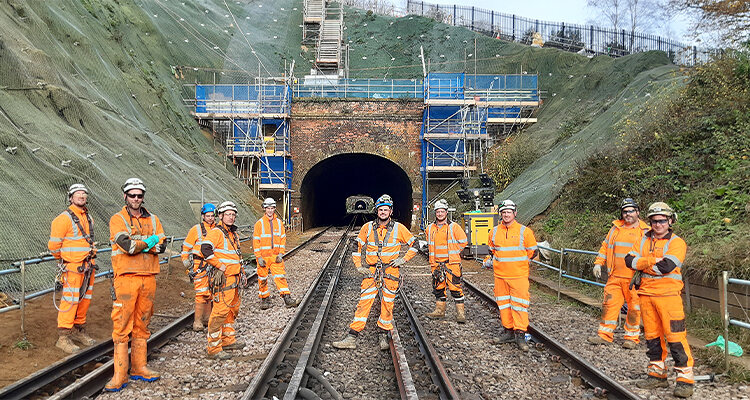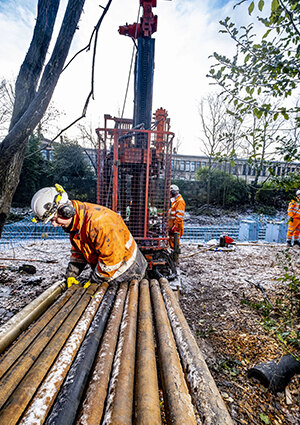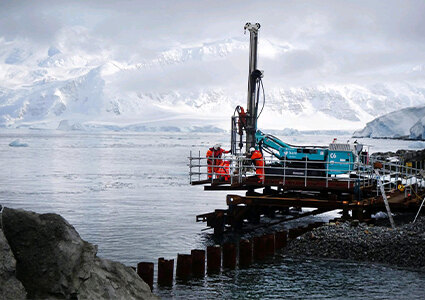
We sit down with Matt Ewing to discuss BAM Ritchies’ ongoing success
BAM Ritchies, the ground engineering division of BAM Nuttall, occupies a unique position in the market; it provides fully integrated services for both private and public sector customers, from small local projects to major national infrastructure. With 60 years of experience and expertise, BAM Ritchies has established an industry-leading reputation as the go-to ground engineering team for complex works.
“We started off in the quarries of Scotland, delivering drill and blast services and providing drilling rigs, compressors, and drilling parts,” begins Matt Ewing, Business Development Manager at BAM Ritchies. “It grew from there, taking opportunities wherever possible to enhance our service and grow our offering. In the 1978 Edmund Nuttall, as it was at the time, purchased the business and this enabled us to deliver a much larger projects like Gibraltar, which was a catalyst for expansion and further success.”
The business remained part of Edmund Nuttall through its rebranding process, and today, it forms BAM Nuttall’s geotechnical ground engineering department, as well as being a specialist contractor to the open market.
Matt elaborates: “While we’re part of BAM Nuttall, we surprisingly do around 70 percent of our business with the open market. We’re the largest drill and blast contractor in the UK, for instance, working in many quarries throughout the UK to deliver aggregate. To give you an idea, we processed around 38 million tons of aggregate in 2022.
“We’re unique in the marketplace because we comprise five disciplines: geotechnical, drill and blast, instrumentation and monitoring, ground investigation, and our UKAS-accredited laboratories. Within those five areas, we deliver nine specialisms. There’s many ground engineering and geotechnical companies out there, but I don’t believe any can match the wide range of services we can deliver as a single business.
“We can get involved at the very beginning of a project, looking at feasibilities, designing, ground investigations, but we can also then deliver those plans to meet the needs of the broader project further down the line. Even further than that, we support them through many more stages, using our expertise to ensure they experience successful outcomes.
“Through our laboratory services, we can validate the ground engineering elements, and our monitoring division can install instrumentation to understand and monitor the new assets,” Matt details. “We really go on a journey with our clients over an extended period of time, helping them to better understand their assets and delivering value-for-money solutions at the right time.”
He continues: “Our supply chain is crucial. We own all the equipment for drilling, but we don’t carry a huge fleet of the specialist ancillary kit we need, so we rely on our fantastic supply chain partners to support our operations. Without their support and close collaboration, we wouldn’t be as successful as we are today.
“We’ve had some roaring successes with suppliers of large plant equipment and built longstanding relationships with a handful of specialist companies that have been mutually beneficial: we can rely on them for what we need, but we also support the training of their people.”
As BAM Ritchies prepares to turn 60, Matt is keen to share his reflections on working with the company. “While I’ve been within BAM for 22 years, I’ve been with BAM Ritchies for six years, which is just one tenth of the company’s existence – and what a fantastic time it has been,” he recalls. “It’s great to take a moment to reflect; on the incredible people we have, the innovative solutions we’ve delivered over the years, and the challenges we’ve overcome.”
Crucial projects
Turning to its current operations, the business is working on five major projects across the UK: the TransPennine rail upgrade from Manchester to Leeds, HS2, Hinckley Point C, phase four of Network Rail’s Southwest Rail Resilience Programme, and Devonport Dockyard.
“We’ve been working at Hinckley Point for ten years now, and we’re still there with our laboratory looking after the concrete works and earthworks,” Matt details. “We’ve also recently started work on Phase 4 of the rail resilience programme in the Southwest, which will see us deliver cliff stabilisation work to ensure stability of the cliff and mitigate future risks. We’re also involved in upgrading Devonport Dockyard to prepare the site for the new Astute-class submarine.
“We’re fortunate to have large jobs with some long durations attached to them, as it gives us stability and stands us in a great position to make the investments required to complete the projects. We’ve purchased new piling rigs for our projects at Devonport Dockyard and HS2, for example, and new drilling rigs for the TransPennine rail upgrade.
“In terms of ground investigation, we’re doing a lot of work up in Scotland to support the country’s renewable energy commitments,” Matt reveals. “Specifically, we’re completing ground investigation works in preparation for new infrastructure that will transport power from offshore wind farms to people’s homes or businesses.
 “I also think there’s going to be a burst of energy around pumped hydro storage with regards to energy independence,” Matt proposes. “Renewable energy is very much a part of the UK’s future, but there’s a lot of work to be done and further infrastructure will be required to adequately distribute energy around the country.
“I also think there’s going to be a burst of energy around pumped hydro storage with regards to energy independence,” Matt proposes. “Renewable energy is very much a part of the UK’s future, but there’s a lot of work to be done and further infrastructure will be required to adequately distribute energy around the country.
“I can certainly see our workload shifting away from traditional highways works and towards renewable energy infrastructure, and we’re excited to play a crucial role in underpinning the UK’s transition to renewable energy.”
Exciting developments
On the topic of sustainability, Matt continues: “There’s no denying that in the ground engineering and geotechnical world, there’s a lot of steel, concrete, and grout – all very carbon-heavy elements. We already use low-carbon concrete and 90 per cent recycled steel, which is now embedded in all our operations. We’re exploring low-carbon options for the grouts we use and we’re soon to introduce hybrid drill rigs in the UK.
“We’re working in numerous other ways to make our operations more sustainable too, and we’re carefully considering how our work impacts the wider environment. In terms of fuelling, we’ve made the transition to hydrotreated vegetable oil (HVO), and we’re investigating solar and hydrogen power to explore how adopting renewable energy can further reduce our carbon footprint.
“We use our SMARTer management system to identify potential investments to enhance our efficiency. We’re constantly investing in both our plant and equipment to ensure we’ve always got the most fuel-efficient engines and models. We’re currently using the latest technology on our drill rigs in the quarries, for example, which result in a 20 per cent reduction in fuel consumption and a 20 per cent increase in operation we get from our consumables and drilling elements.
“Although there’s typically an initial cost incurred by the implementation of sustainable practices, we must put cost concerns to one side and accept the changes we need to make. It’s not about stopping what we’re doing, but rather doing those things in a better way that minimizes environmental impact.”
As our conversation draws to a close and shifts towards the company’s future, Matt reveals some of the exciting developments in the pipeline. “We’re currently involved in an interesting project with Strathclyde University, researching microbially induced calcite precipitation,” he explains. “It’s about mixing bacteria with different nutrients to create calcite crystals, which create strong bonds between grains within the poor soil and sand.
“Essentially, we’re trying to find a way to reverse the geological process by taking sand or soil and turning it into rock. We’re now looking to trial the technology with various government bodies to tackle coastal erosion and ground improvements. It can also repair cracked concrete, resulting in a self-healing concrete that is amazingly sustainable and very low carbon.
“It’s a really exciting technology that I’d like to see us rolling out for real-world uses in the next five years,” Matt proposes. “Also, within that timeframe, we’ll hopefully be central to the UK’s energy transition, delivering sustainable solutions and the necessary infrastructure.
“In terms of growth, we don’t have aggressive targets, but instead take the mindset of having enough work to keep all our people busy and fulfilled,” he concludes. “We believe that if we create the right conversations and have positive engagements with customers, then a natural by product is financial success.”
www.bamnuttall.co.uk/groundengineering
